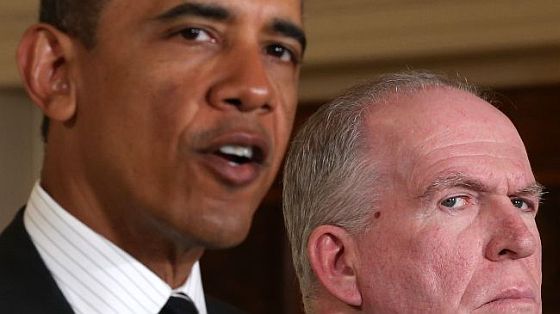First the headline. If I propose to explain why President Obama finds it easy to kill people, don’t I first need to substantiate the assertion that he does indeed find it easy to kill people?
The New York Times provides the evidence and a direct quote: William M Daley, Obama’s chief of staff in 2011, says that Obama described his decision to kill the American cleric Anwar al-Awlaki as “an easy one.”
Given the number of times Obama has authorized people to be killed — some whose names were known yet many unidentified, including women and children — it’s reasonable to infer that Awlaki’s was not the only “easy” killing.
The Times‘ detailed report on the development of Obama’s counterterrorism policy highlights his direct control of the administration’s hit list where he leads weekly meetings to consider who he and his team want to kill next. The president and his advisers understand that they cannot forever keep adding new names to the list. “What remains unanswered is how much killing will be enough.”
Lest there be any doubt that killing is central to Obama’s policy, the report mentions the misgivings of a few.
Obama’s ambassador to Pakistan, Cameron P. Munter, has complained to colleagues that the C.I.A.’s strikes drive American policy there, saying “he didn’t realize his main job was to kill people,” a colleague said.
Dennis C. Blair, former director of national intelligence, points to the underlying cynicism in Obama’s approach and says the strike campaign is dangerously seductive.
“It is the politically advantageous thing to do — low cost, no U.S. casualties, gives the appearance of toughness,” he said. “It plays well domestically, and it is unpopular only in other countries. Any damage it does to the national interest only shows up over the long term.”
In other words, this is a policy that serves Obama’s self interest.
At some point — and we’ll very likely never know when or exactly what he was thinking — Barack Obama must have asked himself whether he was willing to kill people. It’s a question that anyone running to become president of the United States — especially in this era — must pause to consider. But whenever Obama asked himself this question, there is little evidence that he found it difficult to answer. In his mind, it would seem, killing was part of the job.
We are now told Obama “approves lethal action without hand-wringing,” and that when “he applies his lawyering skills to counterterrorism, it is usually to enable, not constrain, his ferocious campaign against Al Qaeda”.
[T]he control he exercises also appears to reflect Mr. Obama’s striking self-confidence: he believes, according to several people who have worked closely with him, that his own judgment should be brought to bear on strikes.
Asked what surprised him most about Mr. Obama, Mr. Donilon, the national security adviser, answered immediately: “He’s a president who is quite comfortable with the use of force on behalf of the United States.”
Every president comes into office with his own conception of presidential power. In his dealings with Congress and with powerful interest groups, repeatedly Obama’s own sense of impotence has been transparent. Rarely, it seems, is there any kind of political pressure to which he is unwilling to yield.
In one telling passage of the Times report we learn that this president has a kind of naive make-it-so view of his own power.
Having decided to shut down Guantánamo, Obama failed to develop a political strategy to win Congressional support. After giving a speech defending his policy:
…the president turned to his national security adviser at the time, Gen. James L. Jones, and admitted that he had never devised a plan to persuade Congress to shut down the prison.
“We’re never going to make that mistake again,” Mr. Obama told the retired Marine general.
General Jones said the president and his aides had assumed that closing the prison was “a no-brainer — the United States will look good around the world.” The trouble was, he added, “nobody asked, ‘O.K., let’s assume it’s a good idea, how are you going to do this?’”
It was not only Mr. Obama’s distaste for legislative backslapping and arm-twisting, but also part of a deeper pattern, said an administration official who has watched him closely: the president seemed to have “a sense that if he sketches a vision, it will happen — without his really having thought through the mechanism by which it will happen.”
If the intrinsic power of office has for Obama so often failed to translate into real political power, there has been one exception: that when orders a killing, death follows.

